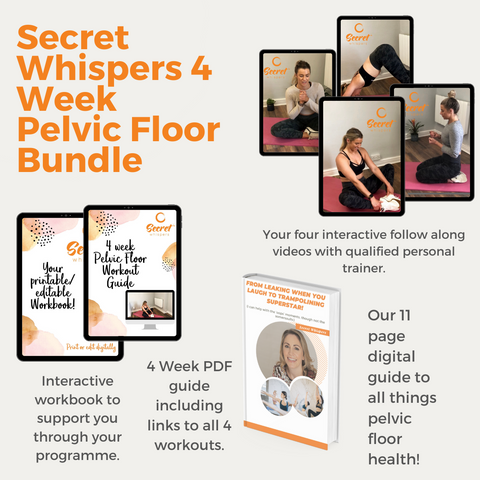What Not To Do With Pelvic Prolapse

Living with pelvic prolapse can be challenging, affecting various aspects of life, from physical health to emotional well-being. This condition, where pelvic organs like the uterus, bladder, or rectum descend into the vaginal space, can lead to urinary or bowel issues, sexual dysfunction, and emotional distress.
In this blog, we'll explore crucial things to avoid when dealing with pelvic prolapse, helping you navigate this condition more effectively.
1. Heavy Lifting & High-Impact Exercises:
One of the key things to avoid with pelvic prolapse is engaging in heavy lifting and high-impact exercises, such as running. These activities can exacerbate symptoms by putting excessive pressure on the pelvic floor. This may lead to increased discomfort, worsened organ descent, and a decline in overall pelvic health.
Exercises Safe for a Prolapse
Instead, consider low-impact alternatives such as swimming, walking, or stationary cycling. These exercises provide cardiovascular benefits without straining the pelvic floor, promoting overall well-being.
2. Straining During Bowel Movements & Urination:

Straining during bowel movements and urination can significantly impact pelvic prolapse. Excessive force can strain the pelvic floor muscles, potentially worsening the condition. I
t's crucial to maintain regular bowel habits and avoid unnecessary pressure during these activities. Always remember to use a footstool when doing a poo. As humans are actually designed to squat when we poop.
3. Ignoring Kegel Exercises:
Kegel exercises play a vital role in strengthening the pelvic floor muscles. Ignoring or neglecting these exercises can contribute to the progression of pelvic organ prolapse. Regularly incorporating Kegels into your routine can help provide support to the pelvic organs and alleviate some symptoms.
4. Smoking:
Smoking is linked to various health issues, and it can negatively impact pelvic prolapse. Smoking weakens connective tissues and reduces blood flow, which may compromise the integrity of the pelvic floor. Quitting smoking can be a positive step toward managing pelvic prolapse and improving overall health.
5. Chronic Coughing or Sneezing:

Persistent coughing or sneezing can increase intra-abdominal pressure, straining the pelvic floor. This can contribute to the progression of pelvic organ prolapse.
Managing underlying causes of chronic coughing, such as allergies or respiratory conditions, can help mitigate this risk.
And, ALWAYS remember to use the 'Knack' technique whenever you cough, laugh, sneeze or lift anything heavy to protect your pelvic floor.
6. Prolonged Sitting:
Extended periods of sitting can contribute to pelvic organ prolapse. Sitting for long durations can place increased pressure on the pelvic floor and may worsen symptoms. To minimize the impact, take breaks, stand, and stretch regularly. Incorporating proper posture and ergonomics while sitting can also help alleviate strain on the pelvic area.
7. Untreated Constipation:
Neglecting constipation can be detrimental for those dealing with pelvic prolapse. Straining during bowel movements due to untreated constipation can exert unnecessary pressure on the pelvic floor, potentially aggravating the condition. It's essential to maintain a diet rich in fiber, stay hydrated, and address constipation promptly with the guidance of a healthcare professional.
8. High-Impact Sexual Activities:
Engaging in high-impact sexual activities can be detrimental for individuals with pelvic organ prolapse. The vigorous movements associated with certain sexual positions can exert excessive pressure on the pelvic floor, potentially worsening symptoms. It's advisable to explore gentler and more supportive sexual positions that minimize strain on the pelvic organs, ensuring a more comfortable and safe experience.
9. Excessive Straining in the Gym:
While exercise is crucial for overall health, excessive straining in the gym can pose risks for those with pelvic prolapse. Heavy weightlifting and intense abdominal exercises may strain the pelvic floor muscles, exacerbating the condition. It's essential to prioritize moderate and pelvic floor-friendly exercises, incorporating proper form and technique. Consulting with a fitness professional or physical therapist can help design a workout routine that supports pelvic health.
10. Lifting Children, Cars Seats Or Anything Heavy Without Using The 'Knack' Technique:
Lifting children without proper technique can strain the pelvic floor, especially for those with pelvic prolapse. Always use the "Knack" technique, which involves contracting the pelvic floor before and during lifting. This helps support your pelvic floor and focus on maintaining a good posture.
Bend at the knees, keep the child close to your body, and use the strength of your legs to lift, minimizing strain on the pelvic floor muscles.
Can Pelvic Floor Exercises Reverse Prolapse?
Pelvic floor exercises, including Kegels, can be beneficial in managing pelvic prolapse, especially in mild to moderate cases. These exercises help strengthen the pelvic muscles, providing support to the organs and potentially preventing further descent. While they may not reverse severe cases, incorporating pelvic floor exercises into your routine can contribute to symptom improvement.
In conclusion, managing pelvic organ prolapse involves avoiding or minimizing certain activities that exacerbate symptoms and adopting practices that promote pelvic health.
If you have concerns or experience symptoms, it's crucial to seek professional advice. For more information on pelvic prolapse and related topics, check out our blog. Feel free to explore our range of products designed to support pelvic health.
For more information on urinary incontinence and pelvic health, explore our Pelvic Floor Exercise Kit . Just 15 minutes a day to a stronger pelvic floor.
Explore more articles on pelvic health:
- Do I Have a Prolapse? First of All, Please, Please Don't Panic!
- Pelvic Organ Prolapse and Infertility
- Can a Pelvic Organ Prolapse Cause Fatigue?
- Can You Have Sex with a Prolapse?
- 27 Pages full of lots of great information.
- Recommended foods you can eat to help you naturally increase your estrogen and some fabulous recipes.
YOUR 4 WEEK PELVIC FLOOR MUSCLES WORKOUT PROGRAMME
Designed to be done anywhere and at any time. Yours to keep forever.












